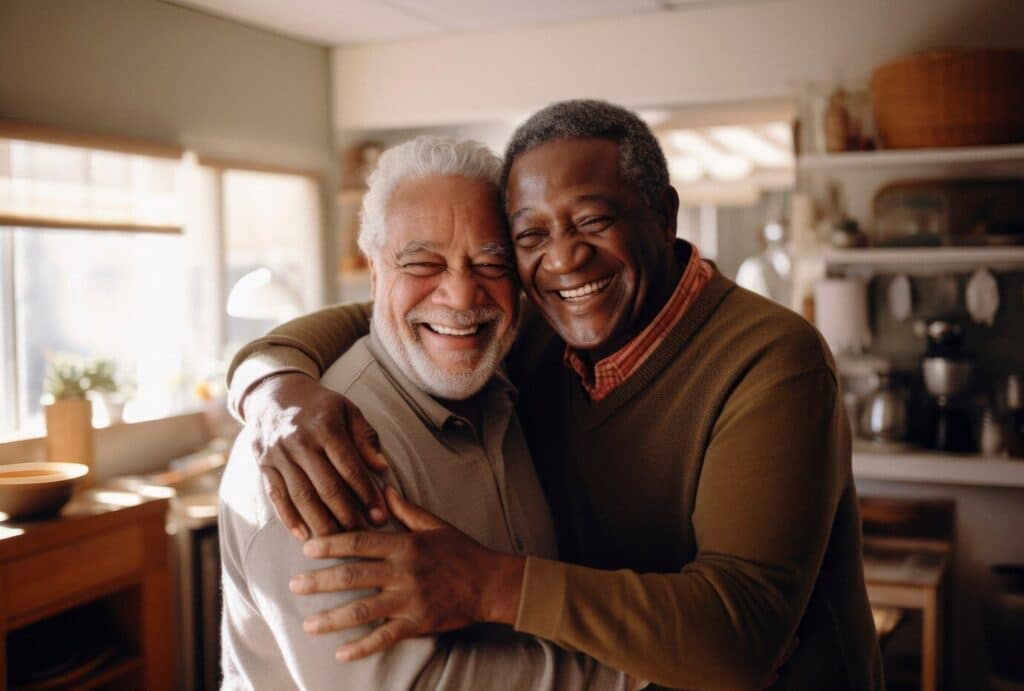Empowering LGBTQ Seniors: Thrive With Pride and Purpose
Aging brings a new set of opportunities and challenges, especially for LGBTQ seniors. While this stage of life can offer space for reflection and empowerment, it also raises questions about access to inclusive healthcare, financial planning, and community support. Fortunately, there are resources and communities ready to uplift and support you every step of the way.
Whether you’re exploring senior living options or advocating for your rights, embracing aging with pride can make this chapter deeply fulfilling. At The Oaks at Paso Robles, we believe in a future where LGBTQ older adults’ health disparities are addressed and all seniors are empowered to live authentically.
Cultivate Supportive Networks
When you prioritize building a supportive network, you enhance your quality of life and create a sense of belonging in the LGBTQ community. Engaging in LGBTQ-friendly activities at local community centers fosters valuable community connections that enrich your social engagement. Seek organizations catering to LGBTQ seniors, as they often provide a safe space for sharing experiences and finding support.
Joining online forums can also be beneficial, offering opportunities to connect with others who understand your journey. Additionally, consider participating in intergenerational programs, which can bridge gaps and foster relationships with younger LGBTQ individuals. These actions empower you and contribute to a more inclusive and supportive community.
Furthermore, peer mentorship programs can provide invaluable guidance and encouragement from others with similar life experiences.
Programs like the LGBT Aging Project are a fantastic example of how older adults can find dedicated support. Volunteering opportunities through LGBT elderly volunteer initiatives also allow you to contribute to your community while forming lasting bonds.
Access LGBTQ-Inclusive Healthcare
Accessing LGBTQ-inclusive healthcare is essential for your overall well-being, especially as you navigate the unique health challenges faced by LGBTQ seniors. Seek out healthcare providers who prioritize LGBTQ health resources and inclusive medical practices. Don’t hesitate to advocate for your needs, ensuring that staff are trained to understand your specific healthcare concerns. Geriatric care managers can provide valuable support in decision-making processes regarding your healthcare options.
| Service Type | LGBTQ Health Resources | Inclusive Medical Practices |
| General Healthcare | LGBTQ-friendly clinics | Non-discriminatory policies |
| Mental Health Support | Specialized counseling services | Affirmative therapy practices |
| Preventive Care | STD screenings and education | Culturally competent care |
| Palliative Care | End-of-life planning resources | Support for family dynamics |
Organizations like SAGE LGBTQ+ offer extensive directories of LGBTQ-friendly providers, mental health resources, and aging support services. Tackling LGBT older adults’ health disparities requires ongoing advocacy, but being informed and proactive can help you receive the affirming care you deserve.
You can also explore national directories through Health Professionals Advancing LGBTQ Equality (GLMA), which connects patients to inclusive medical providers.
Plan for Financial Security
Planning for financial security can feel overwhelming, especially for LGBTQ seniors who may face unique challenges due to past employment discrimination and economic disparities. Start by consulting a financial advisor who understands the specific financial concerns of LGBTQ individuals. Focus on retirement planning—explore savings options that align with your goals and lifestyle. Additionally, consider various insurance options, including long-term care insurance, to safeguard your future.
Stay informed about any changes in laws and policies that could impact your financial rights. Utilize resources tailored for LGBTQ seniors to navigate these complexities. Remember, you’re not alone; building a solid financial plan can empower you to live with dignity and pride in your golden years.
Furthermore, exploring affordable options for long-term care can help ensure that financial constraints do not compromise your quality of life.
Nonprofits such as the LGBT Aging Project and SAGE LGBTQ+ offer financial literacy workshops and legal aid support for estate planning and housing rights.

Advocate for LGBTQ Rights
Advocating for LGBTQ rights is not just about securing protections; it’s about fostering a community where everyone can thrive. By engaging in advocacy, you can help raise policy awareness and guarantee that the unique needs of LGBTQ seniors are met. Get involved with local organizations focused on LGBTQ rights, and participate in community events that promote inclusion.
Educate others about the challenges LGBTQ individuals face, creating a ripple effect of understanding and support. Your voice can amplify the call for LGBTQ-inclusive policies, making a tangible difference. Encourage others to join you in these efforts, fostering community engagement and solidarity. Together, you can advocate for a future where every LGBTQ individual feels valued and empowered.
Additionally, consider utilizing smart home technology to enhance the safety and independence of LGBTQ seniors in your community.
One vital advocacy resource is the LGBT National Senior Hotline, which offers confidential support and information tailored to community seniors.
Create a Legacy of Pride
Creating a legacy of pride allows you to reflect on your journey and share your experiences with future generations. Begin by engaging in legacy documentation, where you capture your unique stories, struggles, and triumphs. This process not only honors your past but also inspires younger LGBTQ individuals. Consider participating in community storytelling events, which foster connection and understanding among diverse voices.
Support LGBTQ causes through LGBT elderly volunteer work or donations, ensuring your values continue to impact the community. Celebrate milestones within the LGBTQ community, reinforcing the importance of unity and resilience. By sharing your narrative, you help create a rich tapestry of experiences that empower others and preserve the legacy of pride for generations.
Additionally, engaging with family members can enhance the sense of belonging and provide meaningful support throughout your journey.
Look into oral history projects like LGBTQ Religious Archives Network’s Oral History Project to contribute your story and inspire others.
Living Authentically and Aging Boldly
As you navigate the golden years, remember that it’s never too late to forge connections and advocate for your rights. At The Oaks at Paso Robles, we believe in surrounding ourselves with supportive networks and accessing inclusive healthcare to guarantee a fulfilling life. Planning for financial security and creating a legacy of pride will help you leave your mark.
So, take the bull by the horns and confidently embrace this journey, knowing that your experiences enrich your life and the LGBTQ community.
For more information or to schedule a tour, please call us at (805) 239-5851 or visit schedule a tour.
Discover the level of care you or your family member requires. What Level of Care Do You Need?
Frequently Asked Questions
What age group has the most LGBTQ people?
The highest percentage of LGBTQ individuals is found among younger age groups, particularly Gen Z adults. Studies show that nearly 1 in 5 Gen Z adults (born between 1997 and 2012) identify as LGBTQ. This reflects greater social acceptance and openness about sexual orientation and gender identity among younger generations. Older age groups report lower percentages, which may be influenced by societal stigma and generational differences in identity disclosure.
How many older adults are LGBTQ+?
It’s estimated that around 2.7 million adults aged 50 and older in the United States identify as LGBTQ+. This number is expected to increase as more openly LGBTQ individuals age. Despite being a growing population, older LGBTQ adults often remain underrepresented in aging services and research. Many have unique life experiences shaped by decades of discrimination or lack of legal recognition.
What percent of baby boomers are LGBT?
Approximately 2–4% of baby boomers (born between 1946 and 1964) identify as LGBT. While this figure is lower than that of younger generations, it may not reflect the full picture. Social pressures and less acceptance during their formative years likely influenced whether individuals openly identified as LGBTQ. As a result, many baby boomers may not disclose their identity even in surveys or public settings.
What is a common challenge for older LGBTQ adults?
One common challenge for older LGBTQ adults is social isolation. Many lack traditional family support systems or may feel unwelcome in mainstream aging services. They also face higher rates of discrimination in healthcare and housing. These factors contribute to increased mental health risks and barriers to accessing affirming care as they age.








